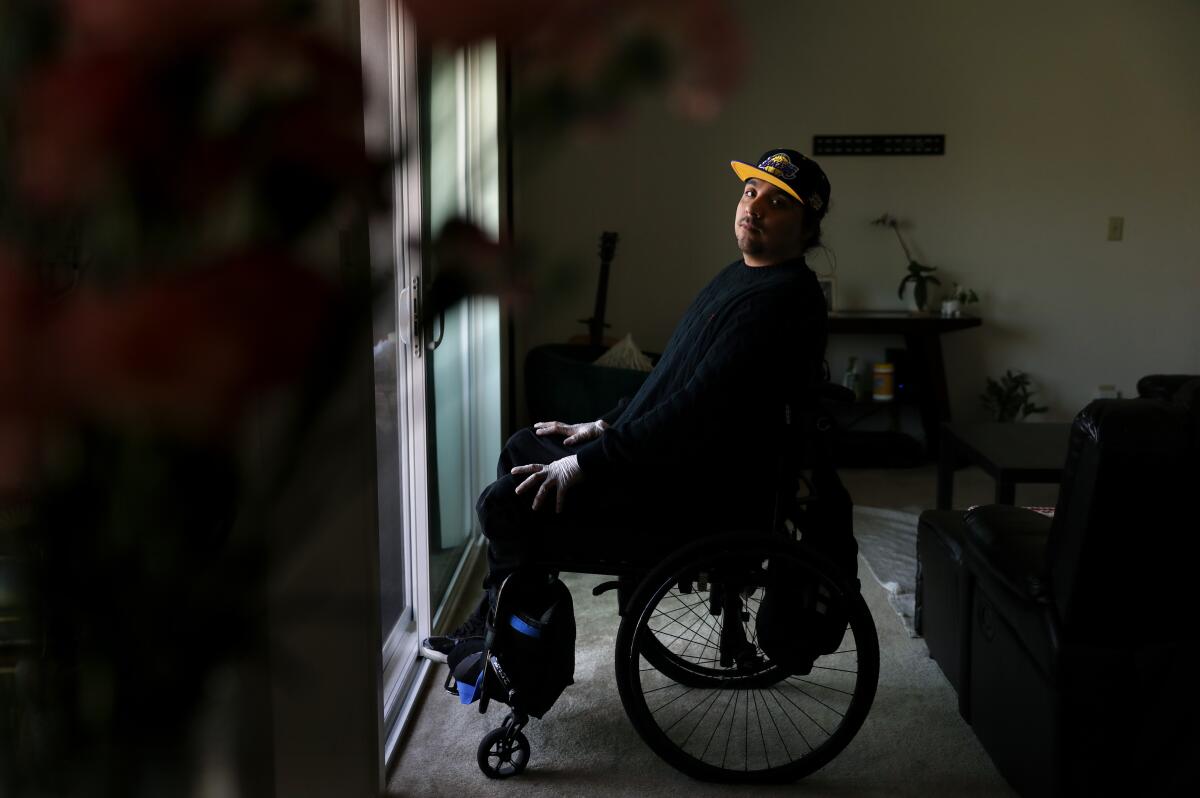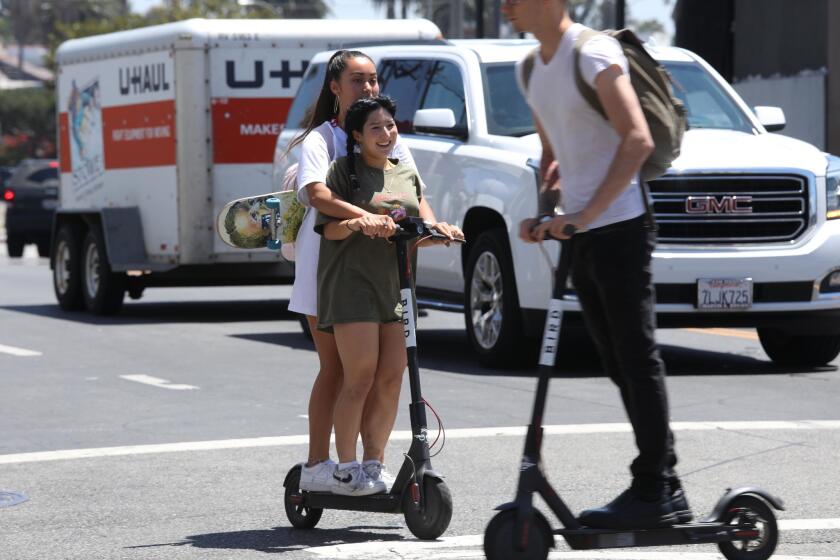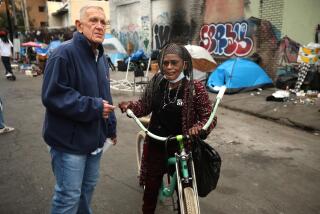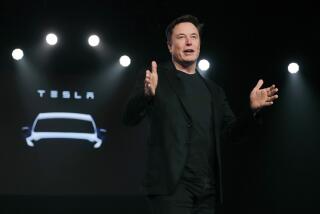Column: Ride a Bird scooter. Have an accident. Pay a mighty price

- Share via
Three years ago, Danny Peña, then 23, was on his way to a job interview at a sandwich shop, riding a Bird e-scooter. He was an experienced rider; in less than a year, he had rented e-scooters more than 400 times in Los Angeles.
On that bright, sunny day, he had traveled almost a mile when his Bird crashed into a sidewalk buckled by invasive tree roots.
Eyewitnesses testified that after he hit the uplifted concrete, he pitched headfirst into an Indian laurel fig tree and ended up in the street, a heavily trafficked stretch of La Brea Avenue just south of Washington Boulevard. In the crash, two portions of his cervical spine and part of his skull were fractured.
Peña would never walk again.
I always knew that catastrophic e-scooters crashes would become part of the urban landscape.
When they first rolled out in 2017, e-scooters created chaos on streets, sidewalks and bike paths until cities were forced to regulate them, develop rules and use technology like geofencing, which renders scooters inoperable in designated areas.
Electric scooters are fun and cheap to ride, but their usefulness has been relentlessly hyped by companies such as Bird, which have no way to enforce their own rules.
These companies have made disingenuous marketing claims about how scooters would ease traffic and save the environment by providing eco-friendly transportation for “the last mile” between buses and subways and the office, while stating in its terms of service agreement that backpacks may not be worn during rides. (Who goes to work without a backpack?)
The scooters aren’t very stable, little kids easily evade the age requirements, few riders wear helmets and people often double up for rides. In California, it’s against the law to ride them on streets where the speed limit exceeds 25 mph and there is no bike lane, or on sidewalks.
But, as Peña testified in a deposition, he’d often ridden on sidewalks where the street was too dangerous (like that stretch of La Brea). He said he was never stopped or cited, even though police officers had seen him numerous times.
::
In November 2019, Peña filed a lawsuit against the city of Los Angeles, alleging it was responsible for the crash.
He and his attorney, Gabriel Avina, contend that the broken sidewalk caused Peña to lose control of the scooter, and a poorly maintained tree caused his injuries. Both sidewalk and tree are owned by the city, which knew or should have known, they claim, about the dangerous conditions.
Daniela Rivera was standing in the alley in front of my garage in Venice, her eyes red and teary.
The city lost a motion to get the lawsuit thrown out and turned to Bird for help with the case. In the failed motion, lawyers for the city argued the city did not know about the broken pavement or fig tree, that Peña accelerated down the hill (which Peña denies), that he had consumed a “large amount of cognac” the night before, that he was over the scooter weight limit by 15 pounds and was wearing a backpack.
As it turns out, when Bird and the city made their business agreement, Bird agreed to indemnify the city against lawsuits related to its scooters. Bird is obligated to pay for the city’s defense and presumably any damages Peña might be granted.
But here’s where the story takes a head-spinning twist:
When Peña downloaded the Bird app and agreed to its terms in August 2018, he unwittingly indemnified Bird against any lawsuits. Bird now claims that Peña owes the company $322,171, the amount it has spent so far defending Los Angeles against the lawsuit.
Even more abominable, Bird argues that if the lawsuit goes to trial and Peña is awarded damages, it is Peña who must pay the damages … to himself.
“This is like a snake eating its own tail,” Avina told me when we spoke by phone Thursday morning. “This guy lives on Medicare. He’s paralyzed.” Avina said experts estimate that Peña will require about $15 million for care over his lifetime.
I’ve never had a high regard for e-scooter companies, but I had no idea how low Bird could go.
In response to my request for an interview about the case, a Bird spokeswoman emailed:
“Bird is not a party to Mr. Pena’s lawsuit against the City of Los Angeles. His accident and the extent of his resulting injuries are unfortunate. The accident occurred while Mr. Pena was allegedly operating a Bird scooter illegally on a city-maintained sidewalk with a BAC [blood-alcohol level] over the legal limit, tested positive for marijuana and in violation of the California Vehicle Code.”
This is the summer of the electric scooter. Which is to also say, it is the summer of chaos.
Bird may not technically be a party to the lawsuit Peña has filed against the city, but it is paying for the defense. Also, just last month, Bird demanded Peña be forced into arbitration with the company over its claim he owes them money to defend the lawsuit he brought against the city.
As for whether Peña was legally drunk or high at the time of the crash, that is unclear. A judge who ruled against the city when it asked that the lawsuit be tossed wrote in her order that no forensically defensible blood alcohol test had been administered. Avina told me that two toxicologists agreed that while cannabis may have shown up in Peña’s urine, there was no way to tell when it was ingested. (Cannabis can be detected long after its effect fades.)
I have no idea what the outcome of this case will be, but I am rooting for Bird’s arbitration demand to be tossed, for a jury to weigh in, or at the very least for the city to settle with Peña.
And I really hope Bird lays off its inane claim that Peña owes it money.
“People should know when they rent these scooters that Bird will come after you,” said Avina. “I don’t fault the city too much, but what Bird is doing is repugnant.”
You’ll get no argument from me on that.
More to Read
A cure for the common opinion
Get thought-provoking perspectives with our weekly newsletter.
You may occasionally receive promotional content from the Los Angeles Times.













